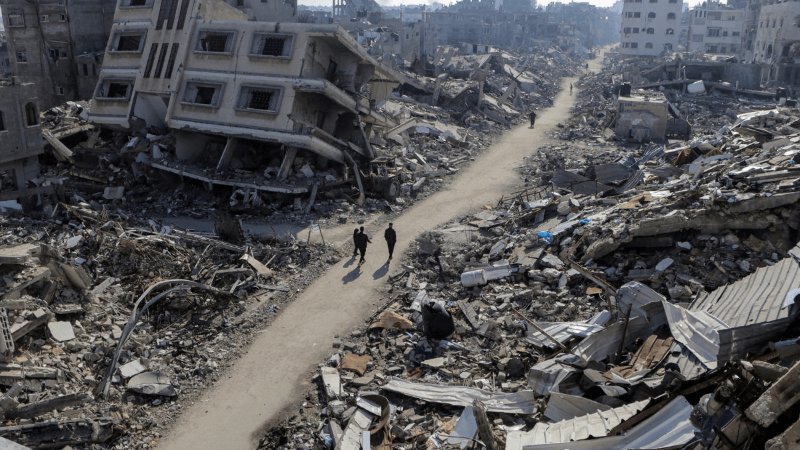Egypt Proposes Hostage Release and Extended Ceasefire to Israel and Hamas Amid Renewed Talks

Egypt has presented a new proposal aimed at facilitating the release of hostages held in the Gaza Strip and securing an extended ceasefire between Israel and Hamas. This proposal comes at a time of increased momentum in peace talks, following significant setbacks for Hamas and its Lebanese ally, Hezbollah. After months of heavy fighting, which has taken a severe toll on the militant groups, recent reports indicate that Hamas may be displaying growing flexibility, possibly paving the way for an eventual ceasefire agreement.
Proposal Details: Hostage Exchange and Ceasefire
According to an Israeli official quoted by The Times of Israel, Egypt’s proposed plan centers on the release of hostages categorized as “humanitarian.” This includes elderly individuals, children, women, the ill, and those who are severely wounded. In return, Hamas would receive a commitment to an extended ceasefire and the release of hundreds of Palestinian prisoners held in Israeli jails. Importantly, the Egyptian proposal does not call for a permanent cessation of the hostilities between Israel and Hamas, but it focuses on securing an immediate reduction in violence and addressing some of the humanitarian concerns that have emerged from the ongoing conflict.
The humanitarian nature of the hostages highlighted in the proposal is significant. Following the October 7 attacks, where Hamas and allied groups abducted 251 individuals and brought them to Gaza, the hostage situation has become one of the most urgent aspects of the conflict. While some hostages have been released during previous ceasefire agreements, others have been rescued in special missions, and some have tragically died or remain unaccounted for. The Egyptian proposal would prioritize those who are most vulnerable, such as the elderly, children, and the sick, hoping to build goodwill and reduce suffering on both sides of the conflict.
Hostage Crisis and the Growing Need for a Solution
The hostage crisis remains one of the central points of contention in the ongoing conflict. As of the most recent reports, around 100 hostages are still believed to be in captivity in Gaza, with fears that a third of them may have already died. In addition to the immediate humanitarian concerns, the emotional and psychological toll on the families of those taken hostage is immense. These families have endured not only the loss of their loved ones but also the daily uncertainty and fear over their fate. The urgency of finding a solution has added pressure to the talks, with many international actors calling for both sides to come to an agreement that prioritizes the well-being of civilians.
Israel’s Response and Role in the Negotiations
While Israel did not draft the proposal, the Israeli official confirmed that Israel is open to discussing Egypt’s plan. In fact, should Hamas express willingness to engage in talks, Israel has stated that it would send a delegation to Cairo to participate in discussions. Though Hamas has not yet publicly responded to the proposal, it is understood that the group may be hesitant to accept terms that do not include a permanent end to the war, something they have consistently demanded. However, there is also recognition that Israel, as well as other regional actors, are committed to finding a diplomatic solution that can bring an end to the violence, even if it is only partial at first.
An important aspect of the proposal is that Qatar has also been kept in the loop regarding the negotiations. While Qatar had previously withdrawn from mediation efforts, citing a lack of serious participation from both sides, it may be willing to re-enter the process if there is tangible progress. Qatar has historically played a role as a mediator in the region, and its involvement could help push both Israel and Hamas toward a resolution. However, it remains to be seen if Qatar’s return to the negotiations would be conditional on certain actions or outcomes from either side.
The Role of US Diplomacy in Shaping the Outcome
In the context of the ongoing peace efforts, US diplomacy plays a significant role. Massad Boulos, an advisor to US President-elect Donald Trump, recently stated that both Israel and Hamas have already agreed on the broad terms of an agreement, particularly regarding the exchange of hostages for Palestinian prisoners. Boulos, who is involved in Trump’s Middle East efforts, indicated that the war itself is practically over, with little to no significant military activity remaining. He noted that the primary issue now is the exchange of hostages, with both sides already having agreed on several previous occasions to engage in such a swap.
While the Biden administration has continued to engage with international actors on the issue, the Trump administration has also remained involved, helping to shape the ongoing dialogue. Last month, Steve Witkoff, Trump’s Middle East Special Envoy, traveled to Qatar and Israel to meet with leaders involved in the peace talks. Witkoff’s role underscores the ongoing influence of the United States in Middle Eastern diplomacy, even as the Trump administration transitions out of office.
Challenges to a Full Resolution: Hostage Exchange and Broader Peace
Despite the progress that appears to have been made in these discussions, there are still several obstacles to a full resolution of the conflict. For one, while both Israel and Hamas have agreed to the broad outlines of a prisoner exchange, there remain significant details to be worked out, including the exact number of prisoners to be released, the timing of the exchange, and the list of individuals involved on both sides. Additionally, Hamas has yet to publicly confirm its willingness to agree to the Egyptian proposal, with many analysts suggesting that the group may be holding out for more favorable terms or even a complete cessation of the war.
Another challenge is the role of external actors, particularly Iran and Hezbollah. Both groups have provided significant support to Hamas in the form of military aid, funding, and political backing. Any peace agreement would likely need to address the influence of these groups in Gaza and in the broader region. Additionally, tensions between Israel and Iran remain high, with Israel viewing Iran’s involvement in Gaza as a strategic threat. Consequently, while Egypt’s proposal provides a potential framework for a ceasefire and humanitarian relief, it may also require broader regional negotiations that address these larger geopolitical issues.
The Broader Context: A Path Toward Stability
The Egyptian proposal represents a potential turning point in the ongoing conflict, offering a path toward de-escalation and humanitarian relief. By focusing on the release of hostages and the continued involvement of international mediators, there is hope that a broader peace agreement could eventually be reached. However, the complexities of the situation—ranging from humanitarian issues to the influence of external actors—mean that this process will be slow and fraught with challenges. The hostages’ fate remains one of the most immediate concerns, and addressing this issue could provide an important step toward stability, but the road ahead will likely be long and complicated.




